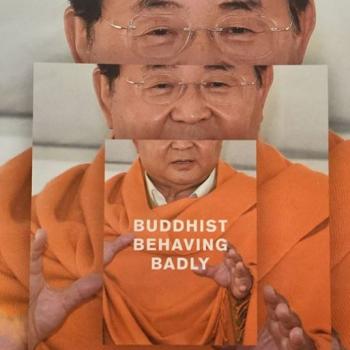Last month a handful of great minds met in Cambridge, England, for a debate. The motion for this debate was, “This House Believes that God is not a Delusion.” In the video shared below are some of the best arguments both for and against the belief in God:
The result: Ayes: 243, Noes, 229: Abstentions: 129.
So, according to the students and others in Cambridge last month, God indeed, is not a Delusion. What do you think?
I have come across several reasons to think of God as a delusion. The first is the fact that believers in God seem very confused about God, or, at least, consistently unable to agree about what He (or, for fun, she) is like or wants humanity to do. I grew up in a nominally Catholic, though practically non-religious household, but I had numerous friends with varying degrees and types of faith in God. None of their claims ever seemed to make much sense, and certainly not the kind of sense that science did. So, around age 13, I formally – and privately – ditched “God.” However, one could say the same thing about quantum physics – even scientists disagree about how best to interpret it. Buddhists also find plenty to disagree about when discussing Buddhism.
Later, studying philosophy and the history of religion, another, somewhat deeper, problem arose: I don’t even know what the word “God“ means. Once, when I told a friend I was an atheist, she accused me of hubris for believing there was nothing “greater” in the world. I hadn’t thought of myself as denying that there was anything greater in the world. As an atheist in my youth, I was simply denying a belief in all of the various conceptions of God that had come to me. The problem emerges in defining “God” either too substantively and running the risk of simply projecting all of your wishes into Him (calling Him ‘Father’ and ‘All Loving,’ etc, smack of Freudian projection), and defining God too thinly, as some of the philosophers’ arguments below do, essentially considering God as a sort of mere logical necessity.
Buddhism might best be described as non-theistic in the Western sense, as it has no creator God. The Gods (devas) of Brahmanism (proto-Hinduism) do find their way into early Buddhism and have remained there ever since. Additionally, as Buddhism has moved around Asia it has tended to absorb the Gods of each new culture. However, the Gods are never central to Buddhist belief or practice and are, importantly, not to be taken as a refuge alongside the Buddha, Dharma, and Sangha. Gods are, like us, trapped in samsara. Insofar as one might take a God for refuge, as those of Western monotheisms do, it seems that the Buddha might consider them deluded. However, it seems just as likely that the Buddha would skillfully use that belief in God to elucidate his own doctrine, as he did in the Tevijja Sutta (DN 13), where he taught two young brahmins, Vāseṭṭha and Bhāradvāja, his practice as a means to ‘dwell with Brahma (God)’.
But that doesn’t rule out the possibility that what the young men thought of as dwelling with Brahma was delusional. In fact delusion (avijjā) is fundamental to human samsaric psychology – but that doesn’t help because it suggests that virtually all of our beliefs are delusional. So perhaps we can ease up no the God idea: maybe it does some good, and, as fellow Patheos blogger James Ford recently noted, Just a Little Reminder: We Are What We Do.
In any case, Nyanaponika Thera sums up the traditional view well here. Ven Dhammika suggests fear is the root cause of belief in God. Meanwhile Lewis Richmond gives a good modern account of how Buddhists can believe in God, noting specifically the definition of God given by St. Anselm (below): “that than which nothing greater can be conceived.”
Below are the three main arguments for belief in God used in the video and some links to Western philosophy on the topic in case you’d like to explore this more. Meanwhile, what do you think?
1) A moral Argument:
- If God does not exist, then objective moral values do not exist
- At least one objective moral value exists.
- Therefore, God exists.
2) Ontological Argument
As the ‘greatest possible being’ God is by definition a necessary being. A necessary being is by definition a being that must exist if its existence is possible. Hence we argue:
- If it is possible that God exists, then God exists
- It is possible that God exists
- Therefore, God exists
To which Kant famously objected:
‘Being’ is obviously not a real predicate; that is, it is not a concept of something which could be added to the concept of a thing. … . By whatever and however many predicates we may think a thing … we do not make the least addition to the thing when we further declare that the thing is. (Kant (1781/1929), A598/B626–A600/B628.) (see paper-pdf) below.
3) Cosmological Argument
The Leibnitzian cosmological argument builds upon the ‘principle of sufficient reason’:
- Everything that exists has an explanation of its existence, either in the necessity of its own nature or in an external cause.
- The universe exists.
- Therefore the universe has an explanation of its existence.
- If the universe has an explanation of its existence, that explanation is God.
- Therefore, the explanation of the universe’s existence is God.
Further Reading for Western Philosophy and God:
Anselm’s Ontological Argument.
Leibniz’s Arguments for the Existence of God (notes, the first being the Cosmological argument).
Hume’s Dialogues Concerning Natural Religion.
Kant’s Response to the Anselm’s Ontological Argument (and a longer paper defending Kant & clarifying aspects of this debate -.pdf-).
Kant’s Objections to All Previous Arguments for God’s Existence (notes on the CPR).











